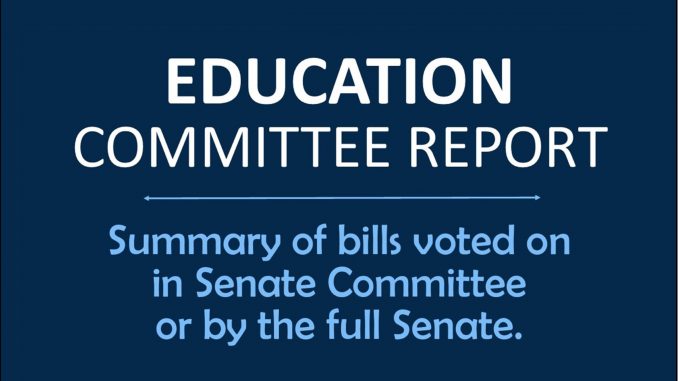
On this page
FLOOR ACTION:
SF 260 – Medicaid reimbursement process by receiving school district
SF 260 is a Department of Education technical correction bill that requires school districts to work together to make sure the sending district for a student with an Individualized Education Program receives the appropriate information back from the receiving district to facilitate Medicaid reimbursements.
[3/17: 47-0 (Excused: Goodwin, Hogg, Nunn)]
SF 467 – Online and remote learning
SF 467 prohibits a school district or accredited nonpublic school from offering online learning or continuous remote learning unless the school district or accredited nonpublic school meets requirements of online-learning courses (Code 256.7(32) or offer and teach (section 256.11(17), or is offering the online learning or continuous remote learning in accordance with a proclamation of public health disaster emergency issued by the governor. However, the bill allows a school to use an online-learning platform to deliver the regular school day coursework for up to five school days when inclement weather causes the school to temporarily close during the regular school calendar. The limitation on the number of school days during which a school district can use the online learning platform to provide regular school day coursework does not apply to an approved online school.
An amendment was adopted that expands online options for more than inclement weather to include other reasons for school closures, like gas leaks, etc. The amendment clarifies that all approved fulltime online schools would be exempt from the five-day limitation—not just CAM and Clayton Ridge—and that schools without a fulltime online approved school do not have to provide 100% online instruction, as was available during COVID-19 timeframe.
[3/17: 47-0 (Excused: Goodwin, Hogg, Nunn)]
SF 532 – BOEE credential licensed behavior analysts
SF 532 will require the Board of Educational Examiners (BOEE) to adopt rules establishing a statement of professional recognition for behavior analysts licensed under Code chapter 154D. This bill is in response to the fact that many health care companies will not reimburse for behavior analyst services provided in school settings without a licensure or credential from the BOEE.
An amendment was adopted that requires the BOEE to establish a professional licensure for Certified Mental Health Counselors that work in schools. The bill authorizes the board to carry out emergency rulemaking to implement the bill. The bill takes effect upon enactment.
[3/17: 47-0 (Excused: Goodwin, Hogg, Nunn)]
COMMITTEE ACTION:
HF 228 – Voluntary Diversity Plan Elimination
HF 228 eliminates implementation of a voluntary diversity plan as a reason to deny open enrollment. Iowa has had school district voluntary diversity plans in place since FY09 and disallows denial of open enrollment based on those plans. Under current law, a school district subject to a voluntary diversity plan or court-ordered desegregation may deny a request for open enrollment of a pupil from one district to another if the superintendent finds that the enrollment or release of the pupil will adversely affect the district’s implementation of the voluntary diversity plan or court-ordered desegregation.
Five Iowa school districts currently have voluntary diversity plans, with three districts using socioeconomic status (Davenport, Des Moines and Waterloo) and two districts (West Liberty and Postville) using English-language learner status as metrics for denying open enrollment.
For most Iowans, open-enrollment decisions are made by the receiving district. If that school system has enough room and the appropriate resources to serve the applicant, approval is likely. The five Iowa districts with diversity plans have the ability to restrict a resident student from seeking open enrollment. In one of the five districts that have a diversity plan, open-enrollments are denied if a student’s departure would cause their neighborhood school to further exceed or fall below the district’s average poverty rate by 10 or more percentage points, a figure calculated using student eligibility for free or reduced-price meals. For Des Moines, that rate is 70.2%. Statewide, about 6% of students participate in open enrollment.
[3/15: 9-5 (No: Democrats; Excused: Goodwin)]
HF 675 – Substitute requirements
HF 675 reestablishes the long-standing rule that allows a substitute to only teach one assignment for no more than 30 days, and it codifies the substitute teacher requirements. The bill moves the substitute teacher authorization from five days to 10 days, which is the same as in the BOEE proposed rule. The school district administrator may file a written request with the board for an extension of the 10-day limit in one job assignment in a 30-day period on the basis of documented need and benefit to the instructional program. The bill codifies that a substitute teacher authorization will require a minimum of an associate’s degree or not less than 60 undergraduate semester hours. This was a change from a Governor’s Covid-19 proclamation.
HF 675 addresses the session delay the ARRC put on a certain BOEE rule proposal regarding substitute teaching requirements. A session delay means that the Legislature must act to address the subject or the administrative rules go into effect upon legislative adjournment.
[3/15: 14-0 (Excused: Goodwin)]
